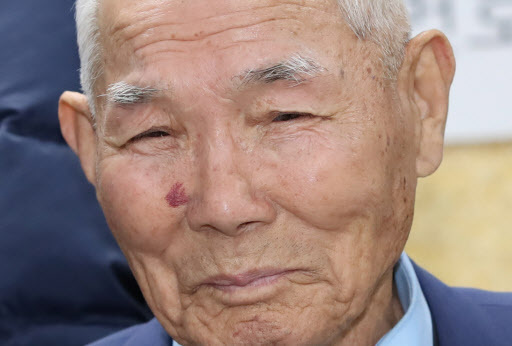Why did it take five years for court to rule on forced labor?
By Ock Hyun-juPublished : Oct. 31, 2018 - 18:22
Tuesday’s ruling that upheld a lower court’s ruling to compensate South Korean victims of forced labor by a Japanese firm during Japan’s colonial rule of the Korean Peninsula came 13 years after the victims filed for damages in February 2005.

It took the Supreme Court five years and three months of deliberation to conclude that the Japanese firm must pay 100 million won ($88,000) to each of the victims, a decision that could have negative repercussions for Seoul-Tokyo relations.
Of the four who filed the compensation suit, only Lee Choon-shik, 94, survives. One of the plaintiffs, Kim Kyu-soo, died in June.
Aside from the gravity of the ruling, there are suspicions the judiciary colluded with the previous Park Geun-hye administration to deliberately delay the Supreme Court ruling in exchange for favors from the administration.
The prosecution is investigating allegations the Supreme Court’s administrative affairs body, under former Supreme Court Chief Justice Yang Sung-tae, and the Park administration plotted to delay the sensitive ruling. The allegations indicate that the court needed the government’s support for creating a new appeals court and sending more judges to embassies abroad, while the Park administration wanted to avoid damaging South Korea-Japan relations by delaying the ruling.
In the process, the Foreign Ministry under the Park administration was allegedly involved in submitting a written statement that could have helped the court rule against the victims.
Foreign Minister Kang Kyung-wha expressed regret about allegations the Foreign Ministry had submitted such a written statement to the court in November 2016.
“I regret as an incumbent minister that the intention and purpose (of the statement) is causing problems,” Kang said at a parliamentary audit last week, vowing a thorough internal probe.
The government has maintained that the issue of the South Korean victims’ rights for compensation was settled under the 1965 treaty that normalized Seoul-Tokyo relations, a position shared by the Japanese government.
The government has maintained that the issue of the South Korean victims’ rights for compensation was settled under the 1965 treaty that normalized Seoul-Tokyo relations, a position shared by the Japanese government.
(laeticia.ock@heraldcorp.com)
-
Articles by Ock Hyun-ju




![[Herald Interview] 'Amid aging population, Korea to invite more young professionals from overseas'](http://res.heraldm.com/phpwas/restmb_idxmake.php?idx=644&simg=/content/image/2024/04/24/20240424050844_0.jpg&u=20240424200058)













![[KH Explains] Korean shipbuilding stocks rally: Real growth or bubble?](http://res.heraldm.com/phpwas/restmb_idxmake.php?idx=652&simg=/content/image/2024/04/25/20240425050656_0.jpg&u=)

